Tag: hair
Four Tips to Help with Damaged Hair
As I’ve learned how to care for my hair over the years, I’ve realized that there are so many things to consider. You know I talk about diet and nutrition all the time for healthy hair, but I don’t often talk about the way I care for my hair on a day-to-day basis aside from that.
The truth is, it’s been a lot of trial and error. I’ve overwashed it, I’ve underwashed it, I’ve tried dozens of different products, I’ve stopped using heat… Even still, I struggled with brittle and breakable hair.
It turns out, I was overcomplicating things. Let me share a few of my simplest hair tips that helped me prevent breakage and split ends, and left me with luscious and healthy hair!
Brushing Your Hair Wet
Your hair is weakest when it’s wet – wet hair tends to be stretchier and more elastic, which can result in easy breakage without care. This means that as you run a brush through your hair post-shower, there is great potential for damage!
For those with straight, thinner texture, brushing wet hair can cause stretching, breakage, and can even pull it right out of its root! This may result in signs of breakage and split ends when the hair dries. On the other hand, those with curly, more coarsely texture, know the challenges of trying to brush hair when it’s not wet. For these individuals, it can actually be safer for it to be brushed when it’s had a little hydration.
I know how annoying it can be to try and tackle tangles after your hair has dried. Which is why I have a couple of tips that might help ease your pain:
- Pre-brush your hair before you get into the shower
- Gently untangle your hair in the shower with your fingers
- Opt for a detangling conditioner or leave-in conditioner for after you hop out of the shower
- If you need to brush through some tangles while your hair is wet, very gently start at the bottom of your hair, and work your way up
You still might have to fight through some tangles later. However, it can greatly benefit your hair to practice a little patience, and to be incredibly gentle with your hair, especially while it’s wet.
Wrap Wet Hair in a Cotton T-Shirt Rather than a Towel
Because your hair is so vulnerable when it’s wet, it’s important to treat it as gently as possible. As our hair drips wet after a shower, many of us may opt to wrap it up in a heavy towel to soak up some of that extra moisture. However, this method of drying hair can actually cause further damage. This can happen for a couple of reasons.
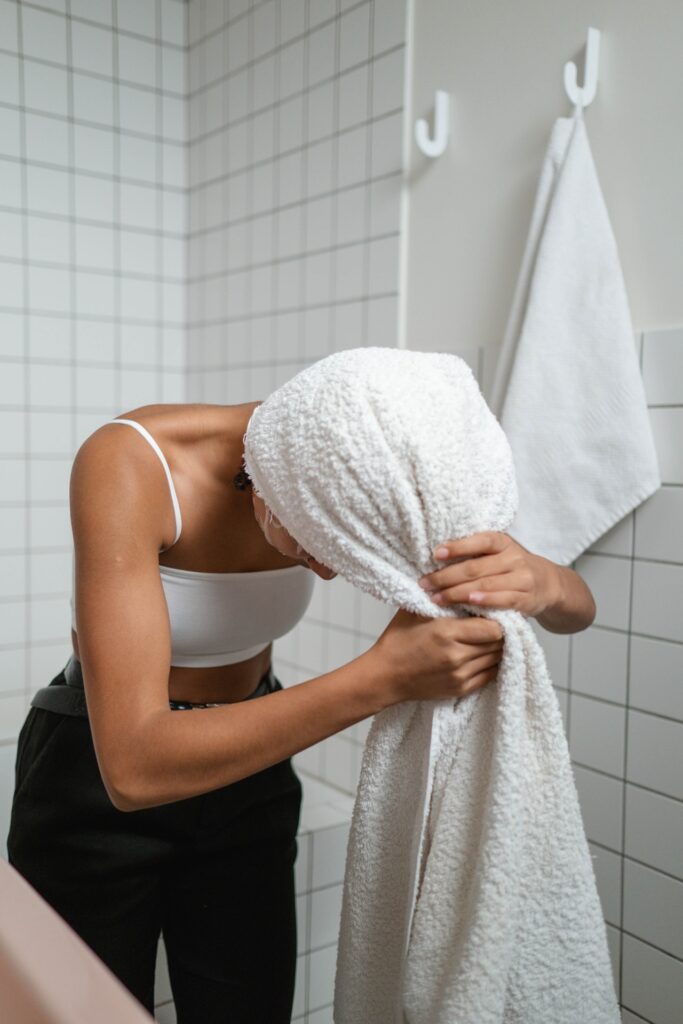
I previously mentioned that our hair is more prone to damage while wet because it’s stretchier and more elastic. Now, imagine the weight of a heavy bath towel, pulling on our scalp and tugging at our hairs as they are twisted into a towel! It makes sense that this technique might actually be causing some damage. Additionally, the fibers in bath towels tend to be rough, and abrasive on hair. The hairs can catch on the rough fibers, and can easily be pulled from their follicle.
So, without a bath towel, how else can you dry your hair? Experts recommend that a soft, cotton t-shirt or small microfiber towel is the best way to soak up the extra water in your hair after a shower! You’ll still want to be gentle, but ultimately, these options will be much less abrasive as it dries. Avoid rubbing or ringing it too aggressively, and this will be a much safer option to protect the quality of your luscious locks.
Avoid Excessive Heat
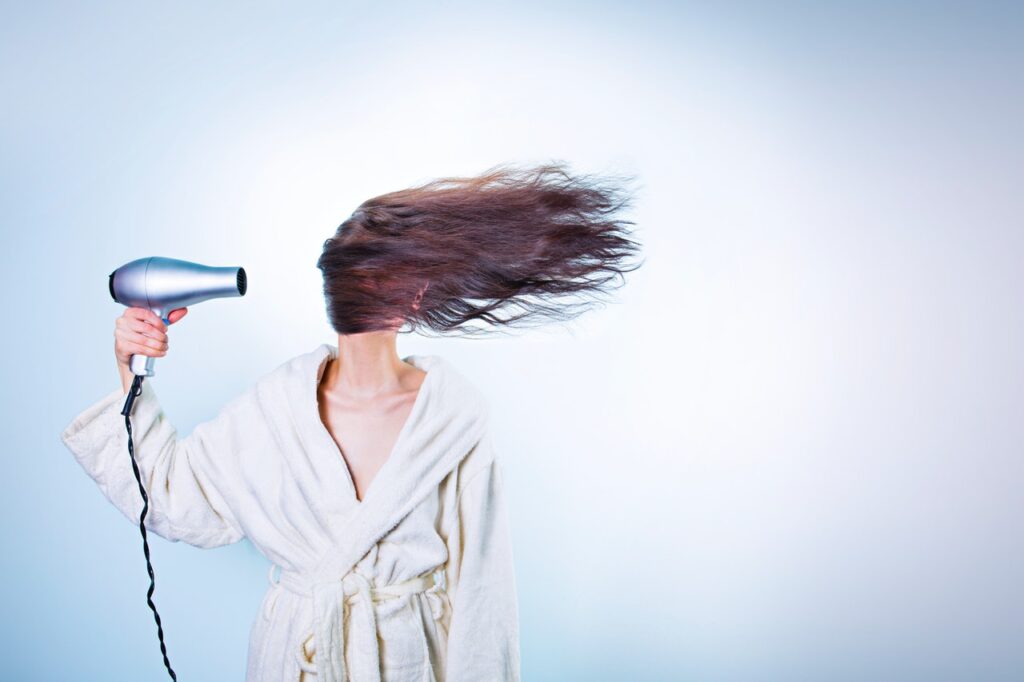
Using heat on your hair is yet another way to cause damage, if you’re not careful. Using heat is not going to compromise itss health right off the bat, it’s the excessive use of heat, and excessive temperatures that can be the most problematic. Heat can cause the cuticle of our hair (the protective outer layer) to lose moisture, become brittle, and make it susceptible to damage.
Just like our skin needs to be protected from the heat of the sun, our hair needs to be protected from the heat of hot showers and styling tools. So, follow these tips if you want to prevent it from being fried!
- While a hot shower always feels amazing, turn down the temperature as much as you can bear when washing and rinsing your hair
- Always use a heat protectant spray before curling, straightening, or blow drying your hair
- Turn down the temperature of your styling tools – thinner and finer hair should aim to use a temperature below 380º, while thicker and more coarse hair can probably tolerate up to 400º
- If you use heat often, opt for a shampoo that is rich in protein to nourish the cuticle of your hair and protect it from heat damage
I used to crank my styling tools to the maximum temperature, but not anymore! And, I try to embrace my natural texture more often to give it a little bit of a break. Providing your hair just a little bit of protection can make all the difference in preventing damage.
Collagen
Of course, if you know my story, you know that collagen has been a game changer for my hair. In just 8 months of taking Complete Collagen+, my hair underwent a transformation. My dry, brittle, and thin hair bounced back, and it was obvious that it was thicker, healthier, and stronger than ever before.
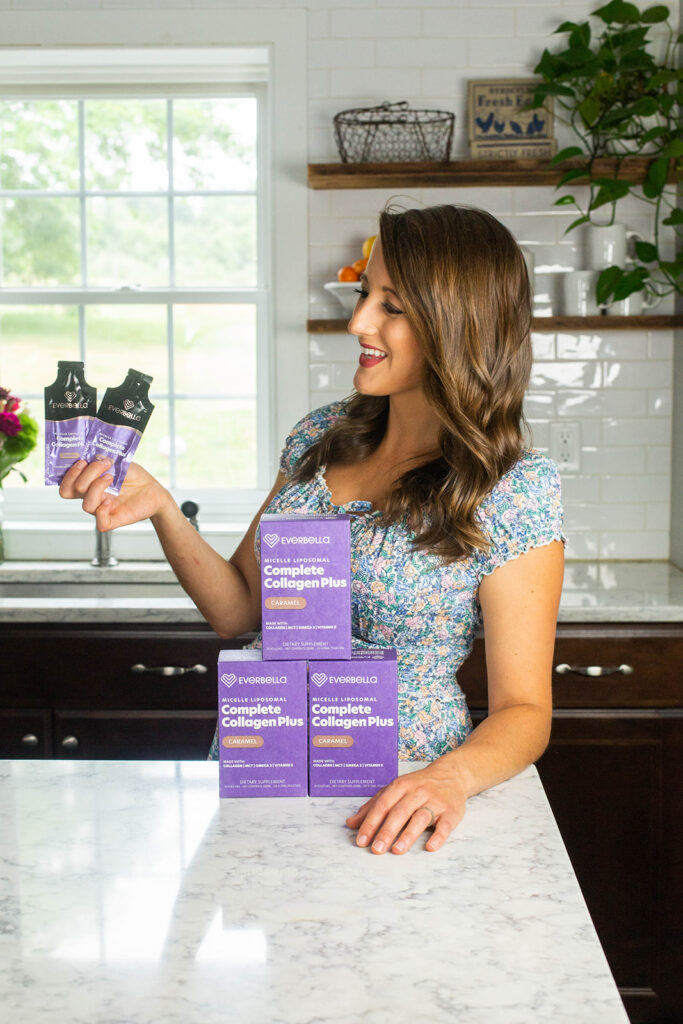
That’s because collagen is an important structural component of most of the tissues in our body, from our bones and skin, of course, to our hair! We need a lot of collagen to keep ourselves looking and feeling our best. And, considering that natural collagen production drops off around age 20, and continues to decrease over time, it’s important for us to continue to optimize our collagen intake as we age. [1]
After years of trying expensive product after product, I realized that I could be doing a whole lot more for my hair by doing less. By using these simple tips to protect it from damage, you could be on track for a transformation. And it doesn’t hurt to give yourself another boost with Complete Collagen+! Give your hair the love and nutrients it needs to thrive!
Citations
- “Collagen Synthesis.” Collagen Synthesis – an Overview | ScienceDirect Topics, https://www.sciencedirect.com/topics/engineering/collagen-synthesis.
Radiate Beauty with the B Complex!
I’ve said it before, and I’ll say it again: when it comes to maintaining the health of our hair and skin, nutrition is key.
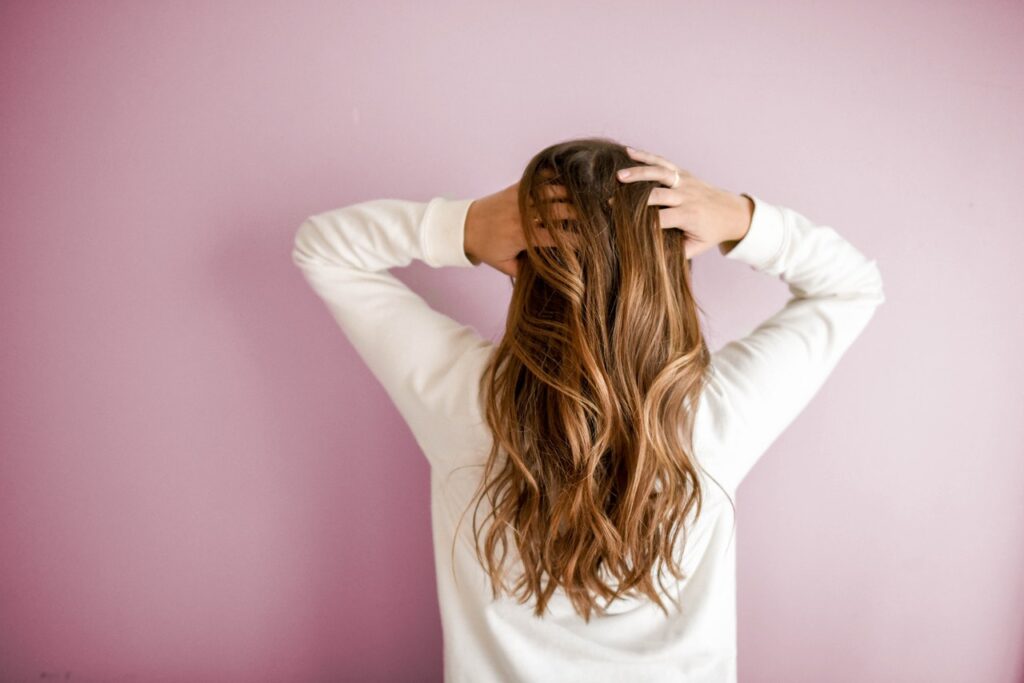
That’s because there are many nutrients we get from our diet that are essential for the maintenance of tissues with high cell turnover and regeneration – i.e. our hair and skin! Trust me, when it comes to beauty that radiates from the inside and out, a healthy diet will set you up for success.
There are a group of nutrients in particular that really make a difference in the health and appearance of hair and skin – the B complex, which is a combination of eight essential B vitamins. Today I will break down the B complex in a little more detail, so you can understand the difference between each of these B vitamins, and how they play a role in your physical health and appearance.
The B Complex
Eight essential vitamins make up the B complex: thiamine (B1), riboflavin (B2), niacin (B3), pantothenic acid (B5), pyridoxine (B6), biotin (B7), folic acid (B9), and cobalamin (B12). Let’s walk through the benefits of each of these vitamins, how deficiency impacts your health, as well as where you can find these vitamins in your diet.
B1 (Thiamine)
Thiamine is the first of the B complex vitamins. It maintains the health and function of our cells & promotes healthy nerve, brain, muscle, heart, stomach, and intestinal function. It’s also essential for our ability to convert carbohydrates into energy, which is essential for the health and survival of all the cells in our body. Thiamine only stays in the body for a short amount of time, so it’s important to be consistent about your daily intake or supplementation. [1]
Thiamine is an incredibly important vitamin for our overall wellness, and there is still much to be discovered about it’s relationship with the health of our hair and skin. One important animal study found that thiamine worked closely with collagen to promote healing after injury, which is another reason why it’s so important to maintain a healthy thiamine status. [2]
Food sources of thiamine include: whole grains, meat, fish, fortified foods like bread and cereals.
B2 (Riboflavin)
Next, we have riboflavin, or vitamin B2! Riboflavin is another B vitamin involved in energy production, cellular function, growth, and development. Which of course, is also an essential component in the turnover of skin cells and hair. While you may not notice the effects of having a healthy riboflavin status, you will certainly feel the effects of deficiency on your skin and hair health.
Riboflavin deficiency results in skin degradation, swollen and cracked lips, red, itchy eyes, as well as hair loss. Deficiency is rare, however, it’s important to know the symptoms and how they may affect your skin and hair health. [3]
Food sources of riboflavin include: Eggs, organ meats (kidneys and liver), lean meats, milk, some green veggies, and fortified foods.
B3 (Niacin)
Niacin, or vitamin B3, is an important vitamin for skin health, as well as energy production (are you starting to notice a trend?). There is also some research to support that niacin is important for reducing risk of cardiovascular disease, by improving lipid levels. [4] Niacin deficiency results in a condition called pellegra, and while rare, this condition can result in a dark and scaly skin rash, as well as inflammation of the tongue, fatigue, and memory problems. [4]
There is some evidence to support that one particular form of niacin, niacinamide, is particularly important for the health and appearance of our skin. In fact, nicinamide may benefit our skin in a variety of ways.
- Niacinamide promotes keratin production in our skin. Keratin is a protein that protects our skin and keeps it strong [5]
- It helps with inflammation, and can reduce redness in conditions such as eczema and acne. [5]
- Niacinamide may help improve fine lines and wrinkles in aging skin. [5]
Food sources of niacin include: Poultry, beef, fish, nuts, legumes, and fortified grains.
B5 (Pantothenic Acid)
Pantothenic acid is the next of the B complex vitamins, and is also an essential component of our metabolism. Specifically, it is important for the breakdown of fats, and the synthesis of essential fatty acids in our body. Dietary panthothenic acid is widely available in our diet. However, when it comes to skin and hair appearance, it’s usually found in synthetic forms. [6]
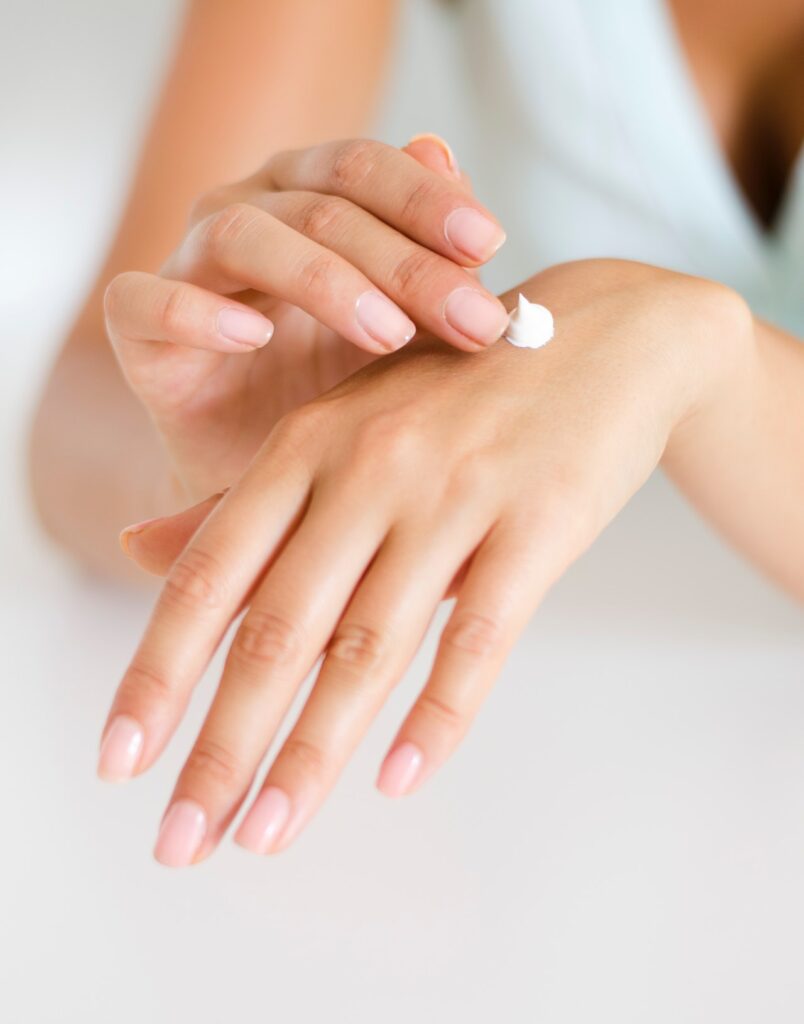
Many cosmetic products include a form of pantothenic acid called dexpanthenol, which helps to add moisture to the skin. Another form of B5, panthenol, is known to improve hair texture and sheen, and may also be effective in preventing acceleration of hair thinning. [7]
Food sources of pantothenic acid include: Beef, chicken, organ meats, whole grains, fortified foods, and some vegetables. It’s important to note that research indiciates that only 40-61% of B5 is absorbed from food. [6]
B6 (Pyridoxine)
Vitamin B6 is an essential B complex vitamin known to be involved in metabolism, particularly the metabolism of proteins. It’s also essential in the maintenance of our cognitive health, and is involved in the synthesis of neurotransmitters. Like some of the B vitamins on this list, it’s essential for the health of our skin. However, one may not notice until they’re deficient in B6.
Vitamin B6 deficiency is associated with dermatitis, scaling lips, cracks at the corners of the mouth, inflamed, swollen tongue, poor immune function, depression, and confusion. It’s important to make sure you’re getting enough B6 to prevent deficiency and associated decline in skin health. [8]
Food sources of pyridoxine include: Fish, beef liver and other organ meats, starchy veggies like potatoes, and non-citrus fruits
B7 (Biotin)
Vitamin B7, or more commonly known as biotin, is an essential nutrient for the metabolism of carbohydrates, proteins, and fats, and is also known to be useful for gene regulation and signaling between cells. Biotin deficiency can wreak havoc on your hair, skin, and nails. Symptoms may include rashes and leisions around your mouth and nose, skin infection, hair loss/thinning, and brittle, breakable nails. [9]
However, some studies have found that biotin supplementation in healthy individuals was associated with reduced hair loss and improved hair growth, though more research needs to be done. [10-11] Ultimately, it seems that preventing biotin deficiency is most important for the protection of your hair, skin, and nail health.
Food sources of biotin include: Organ meats, eggs, fish, meat, seeds, nuts, and sweet potatoes.
B9 (Folate)
Vitamin B9, also known as folate, is an incredibly important vitamin in the B complex. It is most well-known for its role in DNA synthesis. While essential for all, it is especially important for pregnant women, as folic acid deficiency is associated with neural tube defects in fetuses. Folate deficiency is also associated with megaloblastic anemia, sores in the mouth and on the tongue; changes in skin, hair, and fingernail pigmentation.
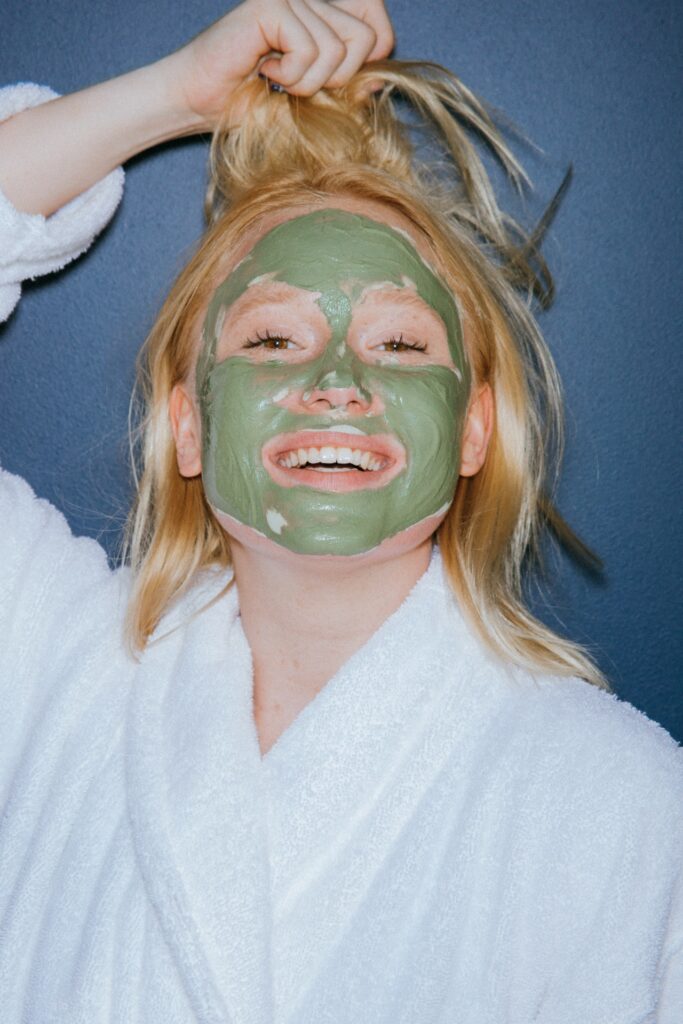
There has been research to suggest that folate is important for those who are living with autoimmune and inflammatory conditions, such as lupus, psoriasis, and rheumatoid arthritis. Folate supplementation may even be a treatment option for those with inflammatory skin conditions, such as psorisias. [12] Because folate is so essential for DNA synthesis, there is also some reason to believe that it can help improve the appearance of skin and hair by promoting healthy turnover of cells. [13]
Food sources of folate include: Dark green leafy vegetables, fruits and fruit juices, nuts, beans, peas, seafood, eggs, dairy products, meat, poultry, and grains
B12 (Cobalamin)
The last of the B complex vitamins is vitamin B12, sometimes referred to as cobalamin. Vitamin B12 often is regarded as one of the most important B vitamins. It is an essential component of the development and maintenance of the central nervous system, and is important for our neurological health. It also helps create and maintain the health of red blood cells, supports health division of DNA, and of course, helps maintain the integrity of our skin, nails, and hair. [14-18]
Deficiency of vitamin B12 is a little more common, as there are some groups of individuals who are at higher risk, such as: the elderly, vegetarians, those who have had gastrointestinal surgery, and those who have pernicious anemia. B12 deficiency may show up in a variety of ways, but can manifest in the skin and hair. Research has show that B12 deficiency may result in skin hyperpigmentation, weakness, fatigue, shortness of breath, tingly fingers, heart palpitations, vitiligo, mouth sores, and hair changes. Even if you are getting enough vitamin B12 through your diet, it may still be wise to supplement. [19]
Food sources of B12 include: Fish, meat, poultry, eggs, dairy products, fortified grains, and nutritional yeast.
Phew. That was a lot of information to cover, but it’s important to know how the B complex vitamins can affect your overall health! Even though there are plenty of ways to get the B complex from your diet, it can be challenging to make sure all your bases are covered. The good news is that I know of a great product that will have you completely covered when it comes to the B complex! You’ve got to try Purality Health’s Micelle Liposomal Active B Complex. Like Complete Collagen+, this supplement was designed specifically with absorption in mind. You can try it risk free for 180 days with Purality Health’s money back guarantee!
Citations
- “Office of Dietary Supplements – Thiamin.” NIH Office of Dietary Supplements, U.S. Department of Health and Human Services, https://ods.od.nih.gov/factsheets/Thiamin-HealthProfessional/.
- Alvarez, O M, and R L Gilbreath. “Effect of dietary thiamine on intermolecular collagen cross-linking during wound repair: a mechanical and biochemical assessment.” The Journal of trauma vol. 22,1 (1982): 20-4. doi:10.1097/00005373-198201000-00005
- “Office of Dietary Supplements – Riboflavin.” NIH Office of Dietary Supplements, U.S. Department of Health and Human Services, https://ods.od.nih.gov/factsheets/Riboflavin-HealthProfessional/.
- “Office of Dietary Supplements – Niacin.” NIH Office of Dietary Supplements, U.S. Department of Health and Human Services, https://ods.od.nih.gov/factsheets/Niacin-HealthProfessional/#h5.
- Gehring, W. “Nicotinic acid/niacinamide and the skin.” Journal of cosmetic dermatology vol. 3,2 (2004): 88-93. doi:10.1111/j.1473-2130.2004.00115.x
- “Office of Dietary Supplements – Pantothenic Acid.” NIH Office of Dietary Supplements, U.S. Department of Health and Human Services, https://ods.od.nih.gov/factsheets/PantothenicAcid-HealthProfessional/.
- Davis, M G et al. “A novel cosmetic approach to treat thinning hair.” The British journal of dermatology vol. 165 Suppl 3 (2011): 24-30. doi:10.1111/j.1365-2133.2011.10633.x
- “Office of Dietary Supplements – Vitamin B6.” NIH Office of Dietary Supplements, U.S. Department of Health and Human Services, https://ods.od.nih.gov/factsheets/VitaminB6-HealthProfessional/.
- “Office of Dietary Supplements – Biotin.” NIH Office of Dietary Supplements, U.S. Department of Health and Human Services, https://ods.od.nih.gov/factsheets/Biotin-HealthProfessional/#h4.
- Glynis Ablon, “A 3-Month, Randomized, Double-Blind, Placebo-Controlled Study Evaluating the Ability of an Extra-Strength Marine Protein Supplement to Promote Hair Growth and Decrease Shedding in Women with Self-Perceived Thinning Hair”, Dermatology Research and Practice, vol. 2015, Article ID 841570, 8 pages, 2015. https://doi.org/10.1155/2015/841570
- Glynis, Ablon. “A Double-blind, Placebo-controlled Study Evaluating the Efficacy of an Oral Supplement in Women with Self-perceived Thinning Hair.” The Journal of clinical and aesthetic dermatology vol. 5,11 (2012): 28-34.
- “Office of Dietary Supplements – Folate.” NIH Office of Dietary Supplements, U.S. Department of Health and Human Services, https://ods.od.nih.gov/factsheets/Folate-HealthProfessional/.
- Gisondi, Paolo et al. “Folic acid in general medicine and dermatology.” The Journal of dermatological treatment vol. 18,3 (2007): 138-46. doi:10.1080/09546630701247930
- Institute of Medicine, Food and Nutrition Board. Dietary Reference Intakes for Thiamin, Riboflavin, Niacin, Vitamin B(6), Folate, Vitamin B(12), Pantothenic Acid, Biotin, and Choline. Washington, DC: National Academies Press; 1998.
- Carmel R. Cobalamin (vitamin B12). In: Ross AC, Caballero B, Cousins RJ, Tucker KL, Ziegler TR, eds. Modern Nutrition in Health and Disease. 11th ed. Baltimore, MD: Lippincott Williams & Wilkins; 2014:369-89.
- Allen LH. Vitamin B12. In: Coates PM, Betz JM, Blackman MR, et al., eds. Encyclopedia of Dietary Supplements. 2nd ed. London and New York: Informa Healthcare; 2010:812-20.
- Allen LH. Vitamin B-12. Adv Nutr 2012;3:54-5. [PubMed abstract]
- Stabler SP. Vitamin B12. In: Marriott BP, Birt DF, Stallings VA, Yates AA, eds. Present Knowledge in Nutrition. 11th ed. Washington, DC: Elsevier; 2020:257-71.
- “Office of Dietary Supplements – Vitamin B12.” NIH Office of Dietary Supplements, U.S. Department of Health and Human Services, https://ods.od.nih.gov/factsheets/VitaminB12-HealthProfessional/#h5.
Collagen is NOT Just for Women!
A common misconception about collagen is that it is just intended for women. But the truth is… Men need collagen too! Why should anyone miss out on the opportunity to look and feel our best every day?
So, for the guys out there – If you are looking at Complete Collagen+ and wondering, “Can this help me too?” The answer is a resounding YES! Complete Collagen+ worked absolute wonders for me (check out my story here), but that doesn’t mean it is just meant for women. We can ALL benefit from such an amazing product. So gentlemen… Fear not. Let’s get into just HOW this product can specifically benefit us all, men and women!
Collagen for Hair Growth
Collagen is a special protein that makes up the important structural components of our bodies. Long, chain-like molecules form to support tissues like skin, ligaments, tendons, bones, and internal organs. Collagen production keeps our skin stretchy and elastic, allows us to heal after injury, and keeps our joints strong and flexible as we move our bodies [1].
The health of our hair, skin, bones, joints, tendons, and organs is not just important for women, it’s important for men too!
But, let’s focus on hair here for a moment, as hair loss can be a scary thing! Even for men.

A 2014 survey by the International Society of Hair Restoration Surgery, saw that approximately 35 million men in the United States suffer from some form of hair loss while approximately 21 million women are affected by hair loss. [2]
Furthermore, the American Hair Loss Association says that by the age of 35, two-thirds of American men will experience some degree of hair loss… And by the age of 50, approximately 85% of men have significantly thinning hair. [3]
Collagen levels in our body decline as we age. It’s thought that after age 20, collagen levels decrease by 1-1.5% every year! This can be amplified even further due to poor habits like excessive alcohol or tobacco use, too much sun exposure, and excessive intake of added sugar. [4]
When we lose collagen in our bodies, it can lead to hair loss.
You see, collagen is a protein that holds the dermal layer of our hair and the follicles together, which in turn keeps our hair strong and healthy. When our collagen production slows down as we age, our hair follicles become brittle. And when the dermal layers get dried up, it can result in hair loss. [1]
It’s clear that hair loss is a valid concern for both men and women. And, collagen is an integral part of having strong and healthy hair. If you notice a bit of hair in the drain in your shower or some thinning beginning to show, it might be a good idea to start supplementing with collagen. Nip that hair loss in the bud before it takes over fully!
Collagen for Muscle Mass
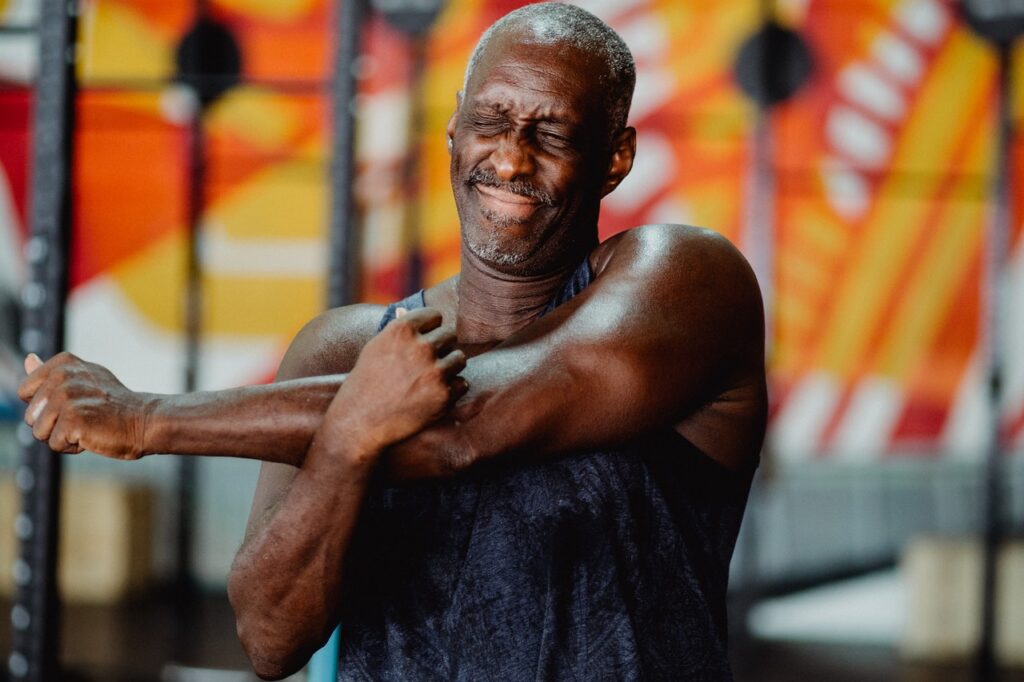
Because collagen is so important for the development and maintenance of most of our body’s tissues, it is thought to be helpful for muscle mass. There are ample amounts of amino acids in collagen – such as glycine, glutamine, and arginine – which play an important role in supporting a healthy metabolism and muscle mass.
Additionally, one experimental study found that collagen supplementation was important for building muscle, and increasing muscle strength in older men. [6] So, fuel up with collagen before you head to the gym later. Your muscles will thank you!
Collagen and Joint Support
Collagen can also work as an important factor in building, repairing and also maintaining the cartilage in our joints. If you have regular wear and tear, work out a lot, or just have a very active lifestyle, some of your cartilage could be worn or damaged.
This can be problematic as our joints rely on the cushioning that the surrounding tissue and cartilage provide. Once the cartilage is damaged, you may experience joint discomfort and general stiffness (which can make it very difficult to get out of bed in the morning). A number of studies have found that collagen can help support the tissue and cartilage that make our joints work smoothly and move effortlessly. This is especially true for individuals experiencing the pain and discomfort associated with osteoarthritis. [7-8]
So, it’s clear that collagen is beneficial for all of us!
More Anti-Aging Ingredients
Not only is Complete Collagen+ full of collagen… But it also has other super beneficial ingredients like MCTs (medium chain triglycerides), Algal DHA (Omega 3 Fatty Acids), and Vitamin E.
- MCTs (medium chain triglycerides) have been shown to promote healthy weight for a few reasons. Some research has found that MCTs can help keep you feeling full, longer. [9] Other studies have found that they provide more instant boosts of energy. For these reasons, MCTs are actively being researched as a way to control weight.
- Vitamin E plays an essential role in protecting the skin from damage caused by free radicals and supporting healthy immune function. Moreover, many studies have found that free radicals can destroy your hair roots. In fact, vitamin E is a powerful antioxidant that can help protect your scalp against damage. It can also help our skin protect itself better from things like pollution, second-hand cigarette smoke, and sunlight. [11]
- Algal DHA (Omega 3 Fatty Acids) have been shown to help your skin seal in moisture and keep pesky skin-irritants out! Even better… It can also promote hair growth. Omega 3’s are also good for maintaining a healthy heart. [10]
All of these ingredients combined make for a product that both men and women can enjoy to look and feel their best.
What Are You Waiting For? Try Complete Collagen+ today.
Citations
- “Collagen.” Physiopedia, https://www.physio-pedia.com/Collagen.
- https://skinkraft.com/blogs/articles/collagen-for-hair#:~:text=Collagen%20holds%20your%20dermal%20layer,up%20resulting%20in%20hair%20fall
- Statistic Brain. “Hair Loss and Baldness Statistics.” Statistic Brain, 1 June 2018, https://www.statisticbrain.com/hair-loss-statistics/.
- “Collagen Synthesis.” Collagen Synthesis – an Overview | ScienceDirect Topics, https://www.sciencedirect.com/topics/engineering/collagen-synthesis.
- Association, American Hair Loss. American Hair Loss Association – Men’s Hair Loss / Introduction, https://www.americanhairloss.org/men_hair_loss/introduction.html.
- Zdzieblik D, Oesser S, Baumstark MW, Gollhofer A, König D. Collagen peptide supplementation in combination with resistance training improves body composition and increases muscle strength in elderly sarcopenic men: a randomised controlled trial. Br J Nutr. 2015;114(8):1237-1245. doi:10.1017/S0007114515002810
- Clark KL, Sebastianelli W, Flechsenhar KR, Aukermann DF, Meza F, Millard RL, Deitch JR, Sherbondy PS, Albert A. 24-Week study on the use of collagen hydrolysate as a dietary supplement in athletes with activity-related joint pain. Curr Med Res Opin. 2008 May;24(5):1485-96. doi: 10.1185/030079908×291967. Epub 2008 Apr 15. PMID: 18416885.
- Bello AE, Oesser S. Collagen hydrolysate for the treatment of osteoarthritis and other joint disorders: a review of the literature. Curr Med Res Opin. 2006 Nov;22(11):2221-32. doi: 10.1185/030079906X148373. PMID: 17076983.
- Kinsella, R., et al. “Coconut Oil Has Less Satiating Properties than Medium Chain Triglyceride Oil.” Physiology & Behavior, Elsevier, 6 July 2017, https://www.sciencedirect.com/science/article/abs/pii/S0031938417302111
- Neukam K, De Spirt S, Stahl W, Bejot M, Maurette JM, Tronnier H, Heinrich U. Supplementation of flaxseed oil diminishes skin sensitivity and improves skin barrier function and condition. Skin Pharmacol Physiol. 2011;24(2):67-74. doi: 10.1159/000321442. Epub 2010 Nov 18. PMID: 21088453.
- Almohanna HM, Ahmed AA, Tsatalis JP, Tosti A. The Role of Vitamins and Minerals in Hair Loss: A Review. Dermatol Ther (Heidelb). 2019;9(1):51-70. doi:10.1007/s13555-018-0278-6 https://www.ncbi.nlm.nih.gov/pmc/articles/PMC6380979/
Deep Cleansing Lemon Hair Scrub
Face scrubs are all the craze and they are great for us – but what about our hair and scalp?
We should be showing our hair and scalp the same love as our skin.
Of course, we all want nourished and healthy hair.
And there are plenty of foods we can eat to help give our hair the nourishment it desires…
But just like our face, we can also add in a nice pampering scrub every now and then.
This is an at-home hair scrub your hair will absolutely LOVE!
The complimenting ingredients will work as a powerful exfoliator and help shed any skin and lose any oil that may be clogging your hair follicles while also hydrating the scalp.
It contains just sea salt, lemon juice, and olive oil. Only 3 ingredients but AMPLE nutrition!
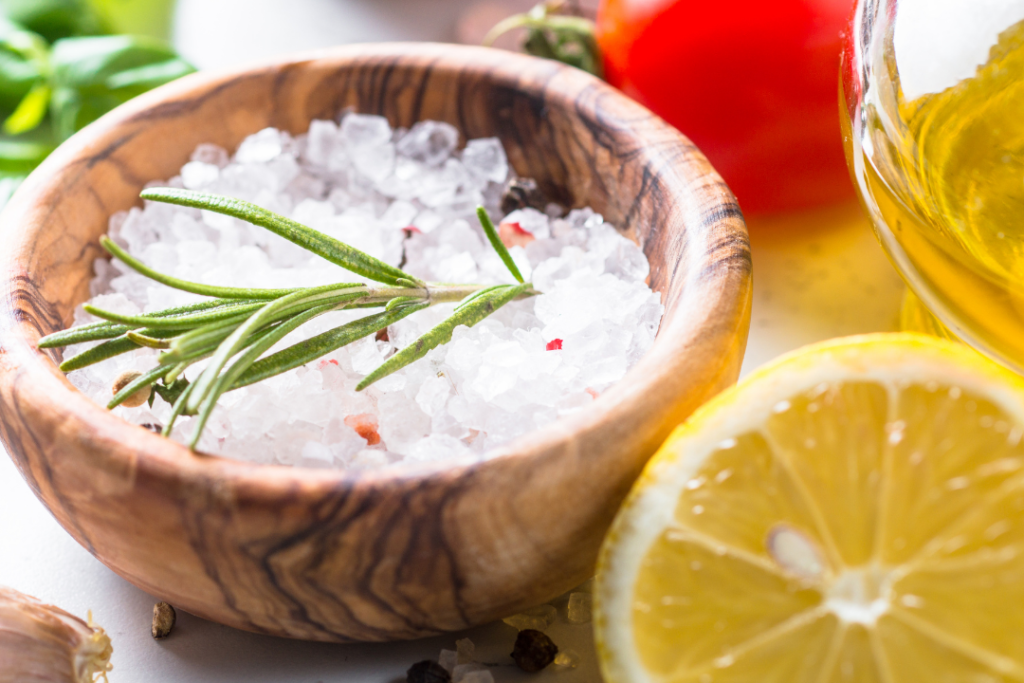
Okay, let’s get started!
Here’s what you need to grab:
- 2 tbsp of sea salt — Salt helps loosen and remove existing flakes while stimulating circulation for a healthy scalp. It also absorbs excess oil and moisture to help prevent fungal growth and lessen the chances of dandruff.
- 2 tbsp of lemon juice — Lemon juice can cleanse the scalp and hair follicles, while restoring healthy pH levels, and removing build-up of hair products, oils, and pollutants.
- 2 tbsp of olive oil — Olive oil is loaded with vitamins A and E which help fight free radicals that can trigger hair loss.
Next…
- Combine all ingredients into a bowl
- Apply the mixture to damp hair while massaging it into the scalp
- Leave on for 10-15 minutes to let it soak in well
- Rinse well with warm water and continue to shampoo and condition as usual
And there you have it!
A super simple but powerful DIY hair scrub that will leave your scalp feeling the love it deserves!
Feed Your Hair: 5 Best Foods For Your Hair
You are what you eat.
That is a very true saying.
And think about it…
If you eat healthy foods, you will feel vibrant and healthy.
And if you eat unhealthy junk foods, you will feel run-down and unhealthy.
So, it’s a no-brainer…
We know we need to eat healthy foods to FEEL healthy on the INSIDE.
But what about on the OUTSIDE?
Did you know that what you eat affects not just your body internally…
But it also impacts the way you look externally?
There are hundreds of studies on this specific to all areas of your physical appearance.
But, for today, I am going to focus on one aspect…
Your Hair.
There are several foods that are beneficial for your hair quality that also provide nutrition.
Your hair is such an integral part of your everyday appearance, so we want to take care of it just like anything else on or in our body – Whether it be promoting hair growth, softer hair, less split ends, or even fuller hair.
Having a healthy balanced diet is crucial for overall hair health.
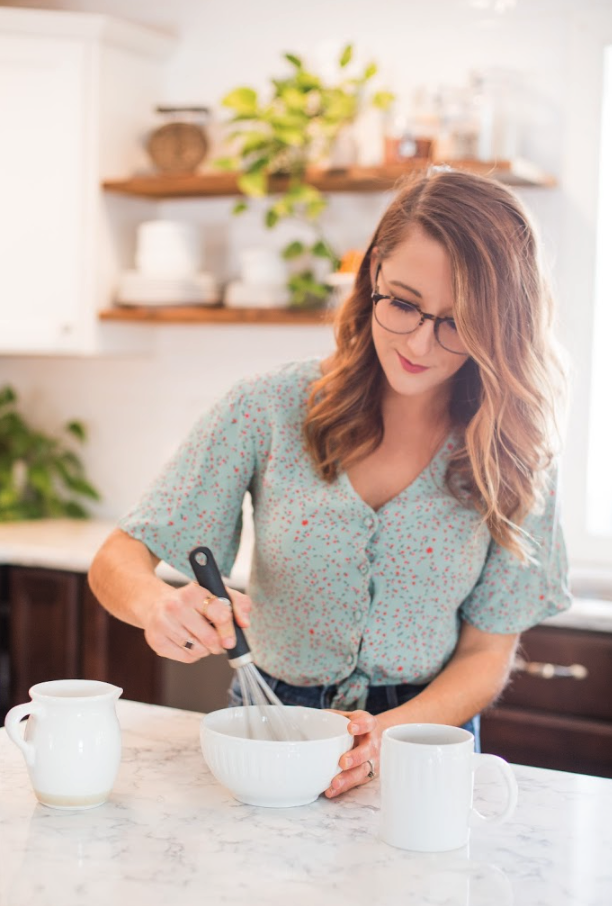
I have always had a love-hate relationship with my hair… I tried so many products to help tame my frizz, split ends, and just make it “look” healthier.
Until I realized…
What if I ate foods that have nutritional value to support my hair health?
Once I put that theory to the test, my hair started feeling so much healthier.
Now as some of you know, I struggled with hair loss issues (which you can read about here)…
Through the creation of Complete Collagen+…
I was able to give an extra boost to feed my hair what it craves.
So between that and these everyday foods I have listed below, I finally have the hair I have ALWAYS wanted!
Without further ado, let me tell you of some foods that you too can eat to support healthy hair!
5 Best Foods For Healthy Hair
Fish & Other Omega 3 Rich Foods
Salmon, trout, sardines and mackerel are all JAM PACKED with healthy Omega-3 fatty acids that our body needs and loves – Both internally and externally! Our body cannot create these fats themselves, so we have to rely on getting them through our diet.
Aside from fish, omega-3s can also be found in other sources such as avocado, pumpkin seeds and walnuts.
Omega-3s can help protect you from disease, but your body also needs them to grow hair and keep it shiny and full.
Omega-3s are found in the cells that line our scalp and also provide the oils that keep our scalps and hair hydrated.
Vitamin C Enriched Fruits
Vitamin C is something we need for so many reasons for our body to function as it’s best, but it is also something important for our hair too. Vitamin C helps with the production of collagen in our body which in turn helps strengthen our capillaries that supply the hair shafts.
Vitamin C is a powerful antioxidant that helps protect against the oxidative stress caused by free radicals. In addition, Vitamin C helps your body absorb iron, a mineral necessary for hair growth.
Some great fruit sources of Vitamin C include:
- Blueberries
- Citrus fruits such as oranges
- Mango
- Kiwi
- Strawberries
- Guava
Spinach & Other Dark Green Leafy Veggies
Spinach, kale and other dark green leafy vegetables come with so many amazing nutritional values. They have a plethora of vitamin A, iron, beta-carotene, folate AND vitamin C – All which work together synergistically to help maintain a healthy scalp and help keep our hair moisturized to prevent breakage.
Spinach also contains Vitamin E, which is widely known to assist with hair health. Vitamin E is known to help support a healthy scalp and hair due to its antioxidant effects. The vitamin’s antioxidant properties help reduce the amount of oxidative stress and free radicals that cause hair follicle cells in our scalp to break down.
Eggs
Eggs are delicious and are so versatile! There are so many ways to eat them… Whether it be deviled eggs, over easy eggs, an omelet, or even just some good old scrambled eggs. Not to mention, the benefits of eggs are endless!
Eggs are rich in a specific B Vitamin called Biotin which is essential for helping your hair grow. In fact, a vitamin deficiency of biotin can actually result in hair loss!
Eggs also contain Vitamin E and A, which are great for hair growth as well as overall healthy hair.
Another great source of Biotin is Avocado. So, maybe try some avocado slices with your eggs!
So we know EATING eggs is beneficial for hair…
But, as an added bonus…
Did you know that APPLYING egg yolk to your hair can also do wonders?
Egg yolk is widely known to actually help your hair grow faster by applying the yolk right to your scalp! By doing so, you are infusing the root of your hair with the vitamins in the yolk. Which means that new hair can grow out stronger, be less prone to breakage, and can even prevent shedding. When your hair doesn’t shed or fall out as much, it is becoming fuller!
Sweet Potatoes
Sweet potatoes are a delicious and seriously underrated food. They taste great baked with just a bit of olive oil, salt, and pepper – and they also come with a ton of nutritional value! They are a rich source of vitamins A, C and E as well as iron, copper, potassium, magnesium and the powerful antioxidant – beta-carotene.
Beta-carotene is known to assist in cell growth, can prevent hair thinning, and can even reduce dullness in hair by bringing back that shine.
Beta-carotene can also be found in other orange veggies like carrots and pumpkin.
Our body naturally turns beta-carotene into vitamin A, which helps protect against dull and dried out hair. It also promotes the glands in our scalp to make a fluid called “sebum,” which keeps our hair from drying out.
There you have it!
5 DELICIOUS foods that can bring back life to your hair!
So next time you hit the farmer’s market or supermarket, be sure to grab some of these foods and give your hair some nutrition too!
Resources
https://www.naturallycurly.com/curlreading/ingredients/the-best-vitamin-for-hair-growth
https://www.ncbi.nlm.nih.gov/pmc/articles/PMC5315033/
https://ods.od.nih.gov/factsheets/VitaminE-HealthProfessional/
https://www.healthline.com/health/biotin-hair-growth#research
